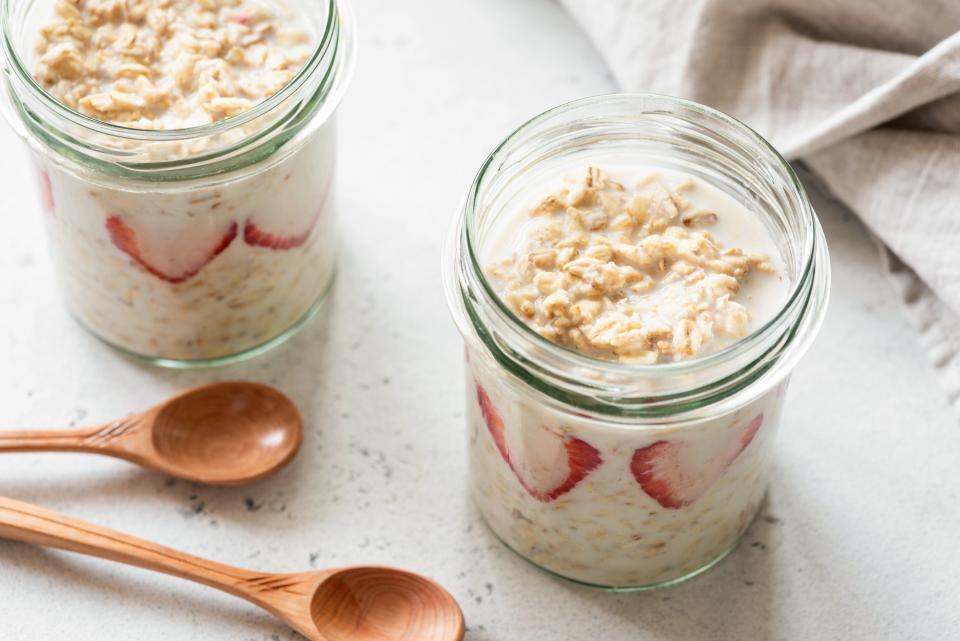A dietitian who researches ultra-processed foods limits how many she eats. She shared her 3 go-to quick, easy breakfasts.
Eating lots of ultra-processed foods is associated with many health problems.
Dietitian and UPF researcher Linia Patel limits her intake by using what's known as the 80/20 rule.
Her favorite minimally processed breakfasts include overnight oats and toast.
A dietitian who researches ultra-processed foods and limits her intake shared her three go-to minimally-processed breakfasts with Business Insider.
UPFs contain ingredients you wouldn't find in a regular kitchen and are made using industrial processes. They're typically ultra-palatable, convenient, and highly manufactured. Over half of the average American's calories come from UPFs, and eating lots of them has been linked to health problems including obesity, type 2 diabetes, and depression.
Dietitian Linia Patel is part of a team at the University of Milan studying ways to address the limitations of how UPFs are classified and their links with chronic diseases.
Her view is that people eat "far too many" UPFs, but we shouldn't get too caught up with the UPF category itself as it does contain some dietary staples.
"It clumps breakfast cereals in the same group as sugary drinks and crisps," Patel, author of "Food For Menopause," said.
Instead, people should focus on simply making meals as nutritious as possible by eating lots of fruits and vegetables, whole foods, and cooking from scratch when possible.
To achieve this, Patel follows the 80/20 rule, which means she eats a healthy diet of mainly whole foods 80% of the time and whatever she wants for the other 20%.
"That might be added sugar, that might be ultra-processed food. But I do it completely guilt-free," she said. This helps her cut down on UPFs without limiting herself too much.
"A healthy diet in the long term is all about a dietary pattern that looks at the diet as a whole," she said.
With that in mind, Patel has three go-to breakfasts she alternates between so she doesn't get bored.
Overnight oats
Patel is a big fan of oats because they contain lots of fiber and are slow-release carbohydrates, which gives her sustained energy, she said.
She likes to make overnight oats and load them with nutrients and protein. She mixes the oats with soy milk and adds Greek yogurt for protein and for her gut health, as it's a fermented food that contains probiotics.
On top, she sprinkles lots of chia seeds to boost the fiber content of her oats, and berries for micronutrients.
She said that swapping sugar-sweetened yogurt, which is typically ultra-processed, for Greek yogurt with fruit can be a good place to start reducing your intake of UPFs.
"Start thinking about how you could make a simple swap to maybe something that is less processed," Patel said.

Eggs and avocado on toast
Patel has recently gotten into baking bread, and because toast is quick and easy, she regularly has it for breakfast.
If she's buying bread, she'll go for sourdough as it's fermented, or something wholewheat with seeds.
"Sometimes I boil eggs while I shower, mash avocado with it, and then put it on toast," she said.
Eggs are a great source of protein and vitamins, and avocados contain healthy fats, fiber, and antioxidants.
Nut butter and fruit on toast
When she's craving something sweet, Patel has toast with nut butter and fresh fruit. She chooses a loaf of bread and nut butter with the shortest ingredients list.
Nuts are a good source of protein and nut butter is considered processed, not ultra-processed, she said.
And instead of jelly, which is high in sugar, she tops her toast with sliced fruit or mashes some raspberries on it.
Read the original article on Business Insider

